Systems & security expert Thomas Homer-Dixon: situation update and battered hope. From Rotterdam, Dr. Yogi Hendlin, exploring the brains of fossil fuel lovers, as the house is on fire. Homer-Dixon is author of “The Upside of Down” and “The Ingenuity Gap”, Director of the Cascades Institute. He says these times of concurrent crises are the new normal. The future will be even stranger.
Two bright minds in difficult times, with tools to cope. Thomas Homer-Dixon and Yogi Hendlin coming right at you, on Radio Ecoshock this week.
Listen to or download this Radio Ecoshock show in CD Quality (57 MB) or Lo-Fi (14 MB)
NEW! EXTENDED-LENGTH HURRICANES THAT LAST A MONTH AND HIT YOU TWICE
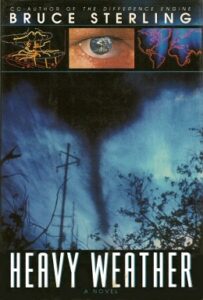
So many extreme events coming on at one time! Another atmospheric river, probably the largest yet, hit California again. Parts of Greenland were 50 degrees Fahrenheit hotter than normal. One Greenland town went to almost 60 degrees F, over 15 degrees C daytime high. In the early March Arctic, that is ridiculous, impossible. The average March high-temperature for the capital city of Nuuk, Greenland is minus 5.1°C (or 22.8°F) .
Antarctic sea ice is at a record low. I have a guest expert coming up on that, in a couple of weeks. But here is the story barely in mainstream news: a hurricane that lasted over a month.
In his 1994 sci-fi book “Heavy Weather”, Bruce Sterling depicted life in a climate devastated North America. It included very long-lasting, perhaps permanent storm zones. Now science fiction becomes meteorological fact with Tropical Cyclone Freddy hitting Mozambique for second time. Tropical cyclones are known as hurricanes to many of you, and typhoons to others. Imagine a Hurricane like Sandy striking New York, and then returning about two weeks later to hit it again. That just happened over Mozambique and other East African countries.
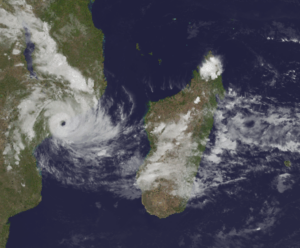
The Weather Underground site, with Radio Ecoshock guests Jeff Masters and Bob Henson, are always the best guides for big weather. They list out a half dozen records broken by Freddy. They report, quote: “Freddy also set a record for the most times any tropical cyclone has rapidly intensified in its lifetime, meaning it gained at least 35 mph of wind intensity in 24 hours or less. Freddy did that for the seventh time Friday into Saturday, three more times than any previous tropical cyclone of record.” Hotter ocean waters are behind that.
Freddy is also a worst case scenario for storm surge, as it crawls along the coast at about 1 mile per hour. Matthew Cuyugan reports Freddy set “the worldwide record for the highest Accumulated Cyclone Energy by a tropical cyclone – currently held by Hurricane/Typhoon Ioke (in 2006)”. Dozens of people have been killed, tens of thousands of homes destroyed, and millions of people in several countries became storm refugees.
What is happening here? Are these the first signs of the super-storms James Hansen warned about, as the planet warms? Hurricane, cyclone, typhoon – call it what you want – when it hangs around for a month battering everything, you have a new kind of trouble. That is what we create when we heat the atmosphere with our exhaust: a wide range of new kinds of trouble. We need to get ourselves under control before it all goes nuts.
After I recorded this broadcast, at least one major American paper covered record-smashing Freddy. It is in the Washington Post, March 14, for those who have access. The BBC has also increased coverage of this record storm.
I’m Alex Smith. Let’s get to our great guests.
===========================
HELP KEEP RADIO ECOSHOCK ON THE AIR, FREE FOR ALL It takes actual money to run a radio studio, phone people all over the world, keep the computers running an all that (I use 3 computer to produce the show). Plus Radio Ecoshock operates a web site that pumps out all our interviews free of charge to thousands of people all over the world – gigabytes per day. To keep this free and freedom of speech, I don’t take corporate advertisers or seek money from philanthropists. The low-key budget is entirely covered by help from supportive listeners. It is listener-supporter radio. Please add your support here.
===========================
THOMAS HOMER-DIXON: THE POLYCRISIS HAS ARRIVED
These are strange and stressful times. Crises all arrive at once: war, disease, and extreme weather from a destabilized climate. As Thomas Homer-Dixon and Johan Rockstrom asked in the New York Times “What Happens When a Cascade of Crises Collide?” I have been recording and interviewing Thomas Homer-Dixon since 2008. He is one of the brightest minds for the big picture, weaving in geopolitics, the environment, and social change.
In Canada, Homer-Dixon is Director and Founder of the Cascade Institute at Royal Road University, and a Research Chair at the University of Waterloo. You may know him for his books like “The Upside of Down: Catastrophe, Creativity, and the Renewal of Civilization” and “The Ingenuity Gap: Can We Solve the Problems of the Future”. We check in with Thomas at Royal Road on Vancouver Island.
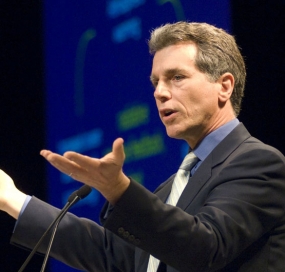
In recent months we had mass mortality events in Turkey, the Ukraine, and a wave of COVID in China that may have killed a millions people. Add in the record-smashing typhoon in New Zealand, drought hitting both Argentina and a winter drought in Europe right now – we can’t keep track of it all. Is this the polycrisis Homer-Dixon warned about for years? Not only that, Homer-Dixon tells us, but disruption is the new normal. We are not going back to how it was.
Download or listen to this 31 minute interview with Thomas Homer-Dixon in CD Quality or Lo-Fi
I went back to a presentation Thomas gave in March 2008 for Toronto Envirofest. It was broadcast on Radio Ecoshock. Speaking as Wall Street Banks like Lehman Brothers collapsed, Thomas said:
“Shocks tend to propagate from one side of the globe to another very quickly as we are seeing again with the credit crisis, or something like SARS.”
That aged well. Here we are with countries like Sri Lanka, Pakistan, and Argentina close to bankruptcy, and this time it’s SARS 2, which we renamed COVID.
“When things fall apart, the worst are full of passion of intensity, and the best lack all conviction.”
– William Butler Yeats “The Second Coming” 1919.
PLAN NOW AGAINST A HYPER-VIOLENT FUTURE
In that 2008 speech, Homer-Dixon added another key vision: ordinary well-meaning people need to plan now – what to do if a crisis breaks the system, whether temporarily or long-term. He warned extremists organize in good time and bad, so they are ready to act in crisis, when we are vulnerable. That reminds me of the attempted insurrection at the American Capitol on January 6, 2021. Authorities seemed unable to protect the Capitol or elected representatives. What can we do to fend off domination by violent people with extreme views?
In Canada’s Globe and Mail newspaper, Homer-Dixon recently wrote “American polity is cracked, and might collapse. Canada must prepare”. I’m sure since the Trump Administration, leaders in Europe are also making fall-back plans in case America goes into more turmoil.
Two totalitarian states, both nuclear armed, wait to see how turbulent American politics will develop. Both are more dependent than they care to admit on the U.S.-led markets and banking system. But Russia and China work almost tirelessly to undermine the “we” in America into warring camps of hatred for “them”. Large organizations, including the Koch-funded groups, are trying to destroy the sense of community we need to function.
We may not know what the future looks like, but we know the future to avoid. We must begin to deconstruct Mad Max world which is building now already, before an a-historic breakdown or collapse.
In recent talks, Homer-Dixon emphasizes how very plastic human civilization has become. It could change quickly – for better or worse. Or it could just become so different we are all confused. But it is still really possible for things to break away quickly from the normal we use as a base. As the biologists discovered, a species can be most fragile at the peak of it’s apparent strength.
THE BOOK OF HOPE
In the year 2000 Thomas published “The Ingenuity Gap” a best-seller in it’s class. In 2006, that was followed by “The Upside of Down: Catastrophe, Creativity, and the Renewal of Civilization.” Some of our listeners think things are so bad, collapse of this civilization is necessary – just to save what is left of the planet. I ask Homer-Dixon about that.
In 2020, just as the COVID pandemic rolled out, he released his latest book, capping off the trilogy. This book is “Commanding Hope: The Power We Have to Renew a World in Peril.” As soon as I saw the word “hope” in the title, I knew this was a difficult sell. A fair number of my listeners don’t want to hear about hope. People tune in to mainstream news for fires, floods, and crisis, and tune out talk about good things. How did the virtue “hope” become so disreputable? Did our brains evolve to record negative threats, rather than ordinary good times?
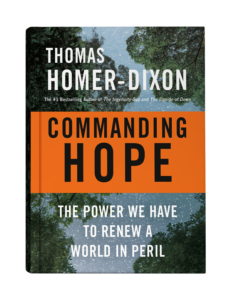
The book was inspired by this quote from Douglas T. Kenrick, in Psychology Today:
“Hope without action will just contribute to a hopeless ending, but commanding hope can turn any one of us into the next hero.”
Homer-Dixon addresses several common criticisms of hope: that is false, that it is naive, and that is it passive, undermining our agency to make things better. In the book he proposes alternatives like hope is honest, astute, powerful, instead. It can be a muscular emotion, hope. It does not evade reality of banking on fantasy, but a realistic hope.
WHAT ARE WE SUPPOSED TO TELL THE KIDS?
Former NASA Chief Scientist James Lovelock wrote his big book ““Storms of Our Grandchildren” because he feared for his own descendants. Homer-Dixon felt obligated to find whatever hope survives – for his own kids, now teenagers. That is why he wrote “Commanding Hope”. But this comes from a realist with decades of work on the big problems facing humanity. He avoid false hopes that are widely sold – “hopium” – to find what he calls “honest hope.”
In the book he offers three injunctions, three rules all humans should agree with:
Don’t wreck our planetary home, don’t commit mass suicide by fighting among ourselves, and protect our children. The book expands on four principles that humans need to survive: security, opportunity, justice, and identity.
Dr. Dixon received his Ph.D. from MIT in international relations, defense and arms control policy. Find a lot more on his web site www.homerdixon.com
Your can watch a YouTube interview by Bartley Groferichter about the new book “Commanding Hope” here.
=========================================
YOGI HENDLIN: “HOSPICE WORKER FOR THE FOSSIL-AFFLICTED”
Are you tired of treading carefully around the fragile tempers of fossil fuel apologists? Here comes a fresh voice with climate truth that gets a little too close to all of us. This February, Yogi Hendlin did it with his biting article “Fossil Fragility”, published at resilience.org.
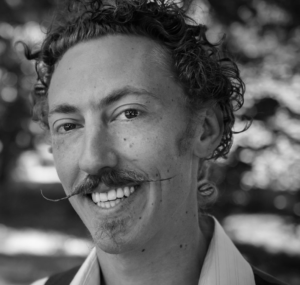
Educated in California, London, and Kiel Germany, Hendlin is an Environmental Philosopher, Political Theorist, and Public Health Scientist. He is Assistant Professor at the Erasmus School of Philosophy in Rotterdam, Netherlands. Dr. Hendlin still maintains research links with University of California.
Download or listen to this 27 minute interview with Yogi Hendlin in CD Quality or Lo-Fi
We talk about “soft climate-change denialists”. How do you try to help defensive people without triggering our own negative emotions? Getting loud or angry doesn’t help. On the plus side, Hendlin says wrestling with people who chose misinformation or no information just made him stronger. At resilience.org he writes:
“The process I’ve had to undergo in the midst of working with soft climate-change denialists is a spiritual battle of looking at my own shit – my own frustrations, resentments, angers, and fears. It has really challenged my own behavioral patterns so that I become less reactive, in order to not trigger the reactiveness of armed-to-the-teeth defense and trigger mechanisms of others. It has been a spiritual practice to not react to the snowflake fossil fuel defenders.”
Yogi Hendlin was in Europe this winter. He experienced first hand the panic as Russian gas ended and household energy bills rose to new heights. That panic led Western governments – who made grand statements about fighting climate change – to approve extra fossil fuel expansion. We must “keep the lights on” and “keep people from freezing to death”. It is hard to argue against that, except to say we should never have become so dependent on fossil fuels in the first place. We can build more security by putting power on your own house.
In his article at resilience.org also points to Rose Abramoff:
“In a recent interview, Rose Abramoff, Earth Scientist and Climate Activist with Scientist Rebellion recently fired from the Oak Ridge National Laboratory for demonstrating at the 2022 American Geophysical Union conference, said:
’That seems interesting to me, that we allow the fossil fuel industry, economists, politicians, celebrities, random people on the internet, the youth which are leading the climate movement – everyone has a stake, and a right to comment on these climate policies; except it seems those who have subject expertise in the area. That seems like an odd policy to me, and I take issue with it.’”
Abramoff is one of too many American climate and environmental scientists who were fired, defunded, and chased away not just in Trump times, but going back decades to the two oil-loving Bush Administrations. It may be part of a longer history of “Anti-Intellectualism in American Life”. That Pulitzer-winning book by Richard Hofstadter is still required reading.
Every American Administration since the 1930’s has deep ties with the fossil fuel industry, source of the richest people in history like the Rockefellers. With decades of lucrative lobby work, the Government was fashioned to protect the “national interests” which quietly included fossil fuel interests and related utilities. With international oil denominated in dollars, fossil fuels were the backbone of the U.S. dollar, and thus the government. Stories about fossil power and raw use of the U.S. military to protect it are legendary, woven into every page of history during the last 100 years.
So who is surprised publicly funded scientists are not free to tell what they know, their thoughts and feelings? The same is going on in Canada, where ten years of rule by literally the representative of the oil patch wiped out the contribution of Canadian climate science for a generation. Russia does not even dare produce world-level climate scientists. That would be dangerous. I could go on, but almost every country is addicted to fossil fuels and represses truth about their deadly impacts, not to mention inequality of wealth on this planet.
At reslience.org published February 14th, 2023, Hendlin writes:
“Part of the problem is tone policing. When climate activists protest for a democratic and science-based government, they are derided as being too shrill, doomerist, or ‘snowflakes.’ Yet when fossil fuel industry apologists get their panties in a twist about converting from gas to electric stoves, they are seen as new traditionalists, defending the sacred values of industry-propagandized home cooking.”
Hendlin also quotes Elizabeth Sawin, Director of the Multisolving Institute, from Hartland Vermont:
“Only a small percentage of the people you’ll meet who want a world of justice and ecology want to wade through the inner and outer devastation created by centuries of a worldview of domination and separation at centers of power.
The closer one happened to born to those centers of power the more invisible and psychically scary it is to look at. But what if I told you there is not any road to the beautiful possible future that avoids that dark shadowy part of the journey?”
Hendlin also writes about “extractivism”. As for extractivism, very few Canadians know, or want to talk about the atrocious human rights and equality transgressions of Canadian-owned overseas mining companies. According to Wikipedia, “Approximately 75 percent of the world’s mining companies are headquartered in Canada, and 60 percent are listed on the Toronto Stock Exchange.” We are the miners and that remains a formidable barrier to discussion. So we all keep quiet about our national polluters to protect our pocketbooks, I guess…
AN ABUSIVE RELATIONSHIP
Remember when oil and gas multinational BP claimed that stands no longer for British Petroleum, but “Beyond Petroleum”. Like all the majors, they dropped their tiny renewable and recycling programs and went back to pumping more carbon into the atmosphere. Like a bad relationship, we took them back. Yogi explains how our game with climate killing is like an abusive relationship.
NOTES FROM OUR INTERVIEW
Yogi Hendlin raises the case of America’s largest battery recycler jailed for infringing Microsoft patents… “Meet the E-Waste Recycler Jailed for a Year for Infringing Microsoft’s Copyright”
“Eric Lundgren spent a year in prison for selling counterfeit Windows restore discs, now he’s home and ready to keep saving the planet.”
Hendlin also wrote: E-cigarettes and a new threat: How to dispose of them
In his Radio Ecoshock discussion of how the Romans developed silver as money in order to pay their mercenary troops, Yogi cites the book “The End of the Mega Machine – A Brief History of a Failing Civilization” by Sabien Scheidler. Found in English online free here. Published 2020.
Scheidler, Handlin says, works with the definition of “mega machine” as developed by Lewis Mumford. It is the marriage of government and industry empowered by a monopoly on violence. That powers the ability to mine minerals and fossil fuels, and to make things that further increase control.
Yogi decries the way corporate funding of science can lead to false debates on subjects like climate change or the real risks of profitable agrochemicals, like Glyphosate or DDT. It leads to “the erosion of public trust in government – through the bastardization of science”.
——————-
BIOSEMIOTICS ANYONE?
That article “Fossil Fragility” was published at resilience.org. But Yogi, is multi-talented. In addition to his long-standing environmental work and studies in public health, he is Editor-in-Chief of the journal “Biosemiotics“. I had to look it up.
This is a whole big beautiful field: how nature communicates within and beyond species using signals. Think of how the flower produces signals to attract the bee. Or the chemicals tree roots send to one another through the medium of fungi. Nature is alive with signals.
Relating to his role in Biosemiotics, Dr. Hendlin discusses “The extended evolutionary synthesis” in biology.
“The extended evolutionary synthesis emphasizes two key unifying concepts that feature in progressive readings of some sections of the evolutionary biology literature – constructive development and reciprocal causation.”
————————
YOU ARE A HOLOBIONT
Yogi also raises the “Holobiont” –
“A holobiont is an assemblage of a host and the many other species living in or around it, which together form a discrete ecological unit through symbiosis, though there is controversy over this discreteness. The components of a holobiont are individual species or bionts, while the combined genome of all bionts is the hologenome.
The holobiont concept was initially introduced by the German theoretical biologist Adolf Meyer-Abich in 1943, and then apparently independently by Dr. Lynn Margulis in her 1991 book Symbiosis as a Source of Evolutionary Innovation.
Holobionts include the host, virome, microbiome, and any other organisms which contribute in some way to the functioning of the whole. Well-studied holobionts include reef-building corals and humans.”
====================================
FOR BLOG READERS ONLY:
AI MIGHT GEOENGINEER NATURE
Let’s take a flyer into a future where most systems are managed by artificial intelligence. AI would run everything from financial systems to production and shipping of consumer goods, even providing virtual relationships. What if a powerful AI system starts putting new signals into Nature, a kind of artificial biosemiotics?
I think there is a potential for artificial intelligence to interfere with natural signaling. Perhaps AI running a big agribusiness notices links between predator insects and watering times. It changes the water timing, which alters all kinds of things, creating waves of different signals for plants and maybe microscopic life. Multiply small changes instituted by AI a billion times across the planet. In a sense, artificial intelligence might be another source of geoengineering, whether intended or not. Have you heard of anyone looking into the collision between AI and biosemiotics?
Going further, I suggest Artificial Intelligence will be aimed at future cognition, that is, predicting the future with relative accuracy. This is already happening with stock trading, climate science, military planning and more. AI can devour mountains of past records, reams of current transactions and measurements. Why not map out the future? That changes everything.
A PERSONAL EMAIL FROM YOGI: THE INDUSTRIAL EPIDEMIC
In an email to me, Hendlin writes:
“The dilemma we’ve gotten ourselves in is the product of competition leading to a race to the bottom, what economists call a ’broken Nash equilibrium.’ Our incentive system rewards all the wrong behavior, which then becomes necessary for everyone to adopt to be able to communicate, be legible to one another, etc. It’s an arms race that no one intentionally set off.
Having studied the biggest industries on earth for 16 years, I see how industrial epidemics occur because the companies that offload as much damage (‘externalities’) on people and nature as possible are more competitive, and thus out-compete their more compassionate or reserved colleagues. It is worse than a conspiracy because nobody wants the results, and nobody intends to set off the cascading harms.”
Alex thinks: so there is no conspiracy of billionaires to profit by wrecking the world. That just happens due to a break down in game theory leaving the worst as temporary winners. No one is in charge. That could be good or bad, depending on how you look at it.
NEXT WEEK
We leave this week’s guests with one small glimmer of hope: humans are much more plastic than our habits and traditions suggest. We can make large changes in small periods of time. This has happened in the past, and could happen in the future.
Next week Radio Ecoshock returns with two voices warning the future you were promised is not possible. From the Post Carbon Institute, Richard Heinberg joins us. He says the renewable energy revolution is not happening, so we need to make other plans. Then super-physicist Thomas Murphy leaves his explorations into space and time to examine his own planet. Explore the places where the Laws of Physics and humans collide.
Please remember to donate something to this program. I’m Alex. Thank you so much for hanging in, and caring about our world.